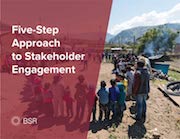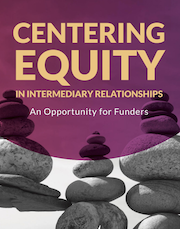Site Search
- resource provided by the Forum Network Knowledgebase.
Search Tip: Search with " " to find exact matches.

In 2019, the landscape of digital communication, international agreements and investor expectations makes stakeholder engagement more important than ever: Digital and social media amplify voices of the public, including civil society organizations; international agreements such as the UN Guiding Principles and Sustainable Development Goals have been established and globally accepted; and investors are significantly more focused on company approaches to environmental, social, and governance (ESG) issues, which in turn necessitate consideration of all stakeholders, not just shareholders.
First published in 2011, this updated guide from BSR is a response to developments over the last seven years, all of which necessitate a far clearer focus on stakeholder trust by corporations. This report aims to provide a comprehensive toolkit that incorporates the latest thinking while maintaining the clarity and practicality of their five-step approach.
Every person wants to lead a safe and healthy life. We want the opportunity to fulfill our greatest potential, and to receive the support and guidance we need to travel down our own unique path. We wish this for ourselves and seek it for our children and loved ones.
In fact, communities all over the country go to great lengths to create conditions for young people to thrive. Every year, efforts to promote youth wellbeing amount to hundreds of billions of dollars in public expenditures in education, health care, community development, and related fields. Together with significant resource contributions from the philanthropic, nonprofit, academic and private sectors, these investments make clear that creating, promoting, and sustaining health and safety for young people is a national priority.
This report details how funders can embrace the power of young people to advance healthier and safer communities.
The New Jersey Arts and Culture Recovery Fund has awarded $1.3 million in grants to 68 nonprofits across the state in an effort to help them recover from the devastating effects of the pandemic.
This is the second round of grants awarded by NJACRF, which is hosted by the Princeton Area Community Foundation. Earlier this year, the fund provided $2.6 million in grants to more than 100 other arts, culture and historical nonprofits statewide.
COVID-19 shuttered venues and forced furloughs and layoffs of more than half of the state’s creative workforce. The state’s nonprofit arts industry reported pandemic-related losses of more than $100 million as of December.
In response to the needs of the arts community, NJACRF was established last year with a gift from the Grunin Foundation, based in Toms River. A coalition of funders quickly followed with their support, to ensure the recovery of the industry.
The Overdeck Family Foundation has announced third-quarter grants totaling $13.5 million.
Six new grants and twenty-seven renewal grants were awarded in support of cost-effective programs with the potential to accelerate improvement in key academic and socioemotional outcomes for all children. Recipients include Future City, a four-month-long afterschool STEM program for grades six through eight, which was awarded $200,000 to increase the number of under-resourced students served, diversify revenue streams, and refine data tracking and reporting practices; Teaching Lab, which will receive $200,000 to pilot a virtual, adaptive, and competency-based delivery model; and Public Impact, which was awarded $700,000 in support of efforts to restructure Pre-K–12 schools to extend the reach of excellent teachers, principals, and their teams to more students, for more pay, within recurring school budgets.

Times of mass mobilization like the uprisings for Black lives and global crises like the COVID pandemic broaden awareness of the work of organizations, collectives, and other groups of people working to transform harmful systems. Some of these groups turn to intermediaries—fiscal sponsors and donor intermediaries—to provide back-office support, grant funding, and other services to support their ongoing work and evolution.
This report explores the ways in which the ecosystem of funders and intermediaries can better support these groups—which we’re calling “constituent-led groups”—who do their work without formal 501c3 status and are often led by and supporting historically oppressed communities.
Today, many constituent-led groups, particularly those that are smaller and geographically isolated, struggle to find fiscal sponsors and other intermediaries that share their values and can provide services that are deeply rooted in racial equity. For a number of reasons, funders—who can’t otherwise support constituent-led groups—often prioritize partnering with intermediaries with a high capacity for scaling services and distributing resources and funds. Though equity values are important to funders in selecting intermediaries to partner with, many funders don’t know what equity-centered services look like or how to support intermediaries in deepening this work.
In this report, we share different ways fiscal sponsors and donor intermediaries have approached deepening equity in their work while meeting the volume of demand from constituent-led groups and funders. We also offer some pathways forward for funders seeking to strategically invest in intermediaries to strengthen their capacity in these areas so they might better serve constituent-led groups.
- The American Express Foundation diversified strategies to build non-profit management skills in its effort to develop diverse talents in the non-profit sector. Some of these efforts include a leadership development program that supports emerging talents from various ethnicities, generations and genders.
- The Baltimore Community Foundation took the first step to educate and inform the foundation internally before sharing its DEI efforts with the community. A shared understanding among internal stakeholders helped align their goals around DEI which made integrating DEI work in the foundation and the community much more effective.
- Access Strategies Fund increased civic participation of diverse communities through equitable grantmaking driven by diverse decision makers and saw dramatic increases in political representation among communities of color.
- The Silicon Valley Community Foundation believes that data can drive equity and publishes data on its website regarding the gender and racial / ethnic diversity of its staff and leadership, and lists the grants it provides to organizations or programs serving ethnically diverse populations.
We are pleased to share Strengthening Philanthropy in Newark - Report to the Field 2015 from the Office of the Newark Philanthropic Liaison. First established in 2007, the Liaison office represents one of the nation’s first formal partnerships between a city and the philanthropic community. The initiative began as a partnership between the Council of New Jersey Grantmakers in collaboration with then Mayor Cory A. Booker. We are proud this unique partnership continues with Mayor Ras Baraka and his new administration.
This report provides a brief summary of some of the substantial activities and impact the Office of the Newark Philanthropic Liaison facilitated throughout 2015. The strategy of collective impact is thriving throughout Newark thanks in large part to the work of the Liaison, and the funding community’s support of and robust engagement with the Office of the Mayor and anchor institutions across the city continue to reap positive outcomes. The Office of the Newark Philanthropic Liaison is supported by: Bank of America, The Foundation for Newark’s Future, Geraldine R. Dodge Foundation, The MCJ Amelior Foundation, The Nicholson Foundation, Panasonic Corporation of North America, The Prudential Foundation, Schumann Foundation for New Jersey, Turrell Fund, Victoria Foundation, and PSEG Foundation providing in-kind support and meeting space.

